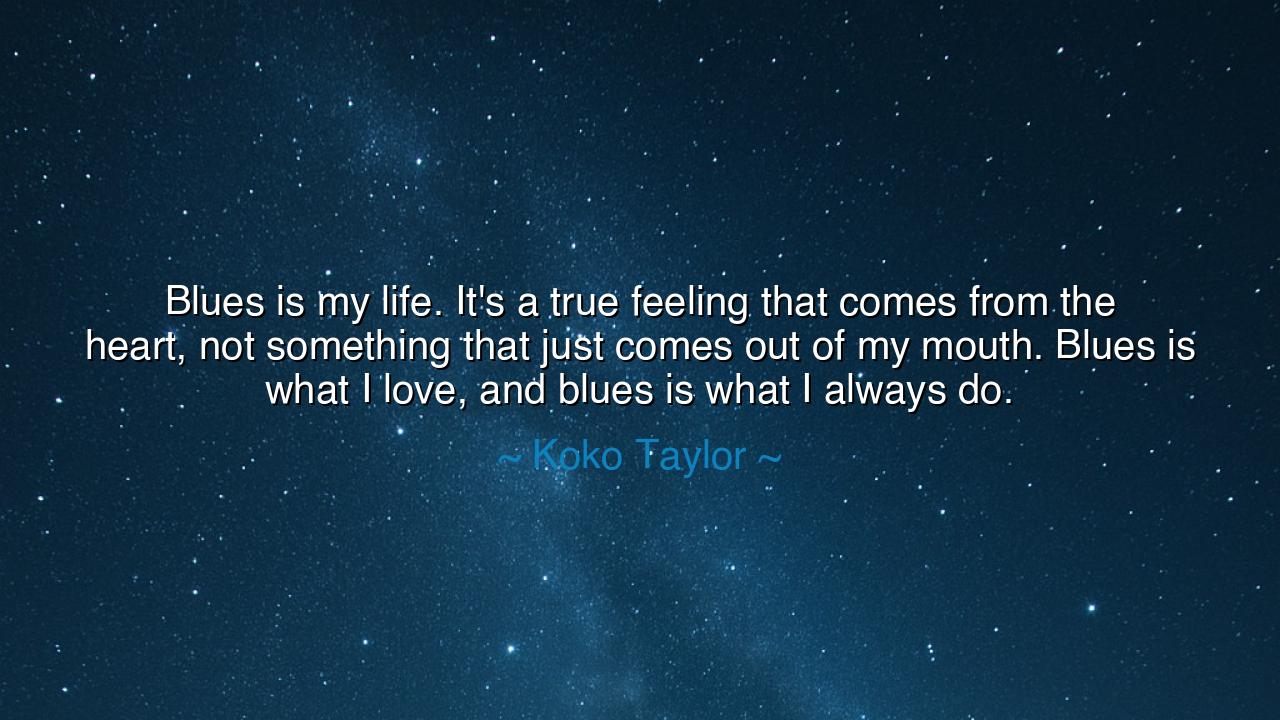
Blues is my life. It's a true feeling that comes from the heart
Blues is my life. It's a true feeling that comes from the heart, not something that just comes out of my mouth. Blues is what I love, and blues is what I always do.






The Queen of the Blues, Koko Taylor, once declared with fire and truth: “Blues is my life. It's a true feeling that comes from the heart, not something that just comes out of my mouth. Blues is what I love, and blues is what I always do.” In these words, she laid bare the soul of a music that is more than notes and rhythm. She spoke of blues not as performance, but as existence itself—a life lived, a burden carried, a joy discovered in sorrow.
To say “Blues is my life” is to confess that the music is not separate from the soul. The blues was born from the pain of a people torn from their homeland, bound in chains, and made to labor in fields under the cruel weight of injustice. Yet from that suffering came not silence, but song. The blues became the voice of the heart when the heart had no other voice. In every cry of the guitar, in every wail of the voice, lies the echo of longing, endurance, and hope.
Koko Taylor reminds us that blues is a true feeling that comes from the heart. It is not artifice, not ornament, not a mask worn for applause. It cannot be manufactured, for it rises from life itself—from hardship, from love, from betrayal, from survival. She knew that the blues does not pass through the mouth unless it has first passed through the heart. Without sincerity, the song is empty; but with truth, it becomes immortal.
Consider the life of Muddy Waters, another giant of the blues. Born in Mississippi, raised in poverty, he carried with him the songs of the Delta. When he sang, it was not polished perfection but raw honesty, carrying the struggles of his people into the world. His music reached Chicago, then the globe, shaping the very foundation of rock and roll. Like Koko, his blues was not something he did—it was who he was. Their lives prove that the blues is not entertainment, but testimony.
In this way, the blues joins the great traditions of human expression, like the psalms of David or the laments of Homer. Each tells us that from the deepest sorrow can come the greatest beauty. The blues transforms pain into power, sorrow into song, despair into dignity. It teaches us that even when life wounds us, we can answer not with silence but with melody. This is why Koko Taylor gave herself fully to it—it was the truest expression of her being.
The lesson here is profound: whatever your calling, let it be like Koko’s blues—something that flows from your heart, something that you love, something you always do. Do not chase only applause or reward. Instead, devote yourself to what feels true, to what gives voice to your soul. For when you live and labor from that place, your work will resonate like a song that endures through generations.
So, children of tomorrow, take this teaching into your lives. Ask yourselves: What is my blues? What truth within me demands expression? Do not be ashamed of struggle, nor hide your scars, for from them can come your most powerful creation. And once you have found your truth, commit to it fully, as Koko Taylor did. Love it, live it, and let it shape your every breath.
Thus remember always: the blues is life itself. It is the art of turning heartache into harmony, and truth into timeless song. Whether you sing, build, teach, or create, let it come not only from your mouth, but from your heart. For it is only then that your work, like Koko’s, will live forever.






AAdministratorAdministrator
Welcome, honored guests. Please leave a comment, we will respond soon